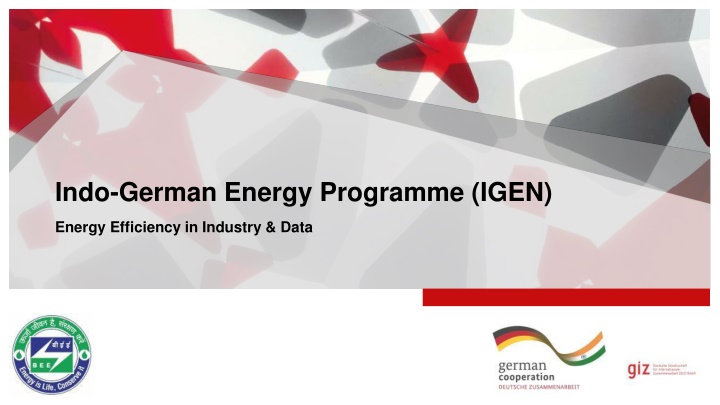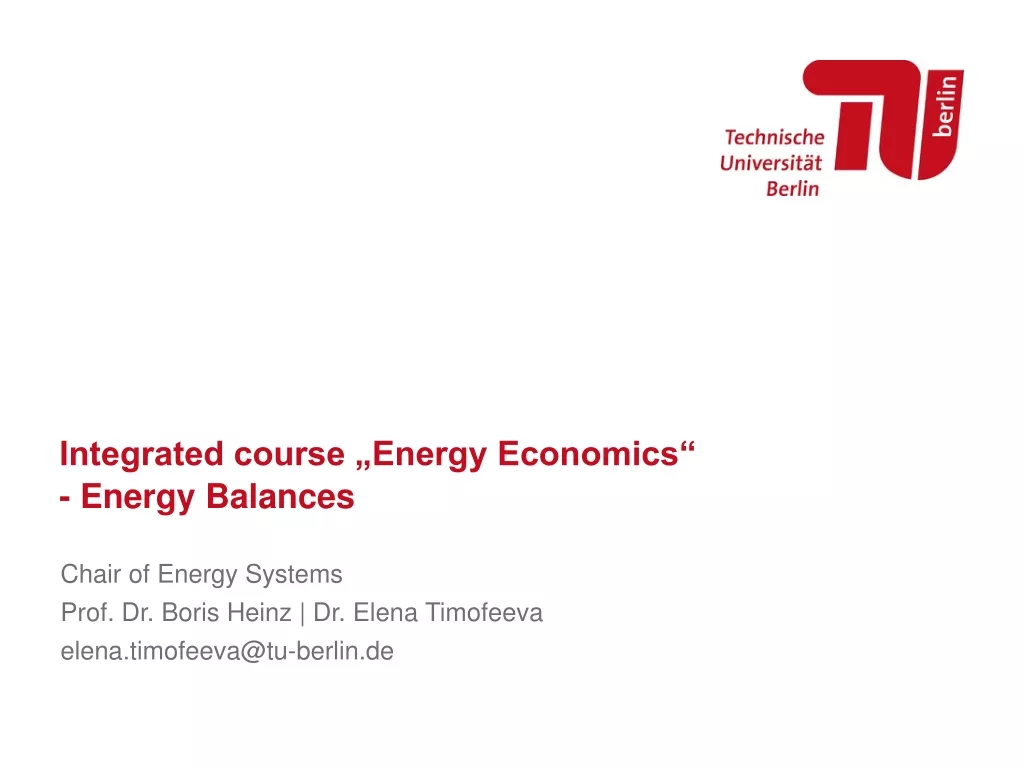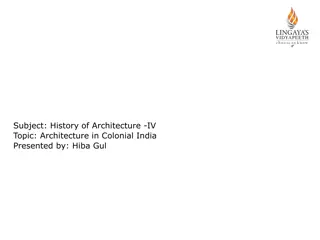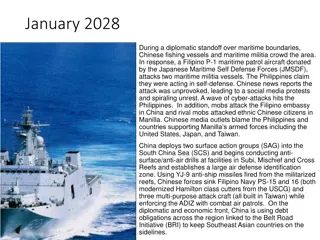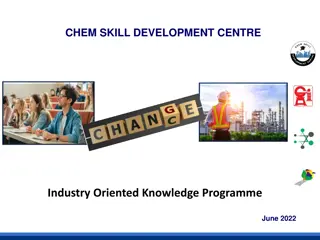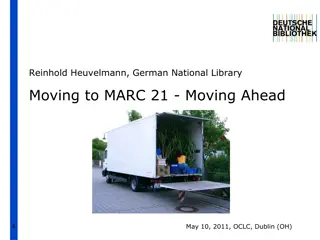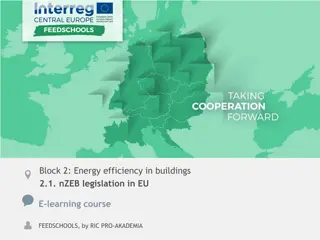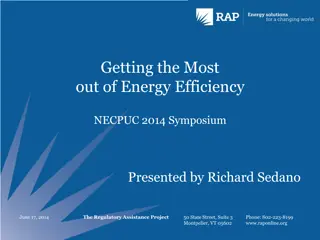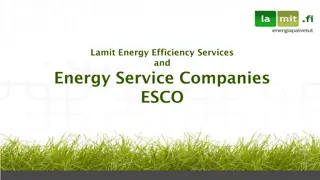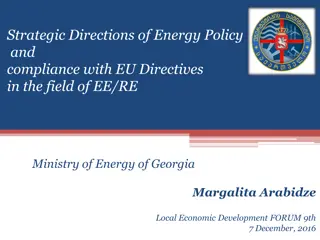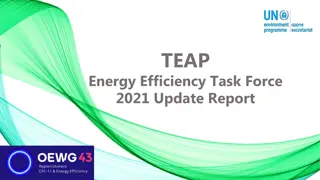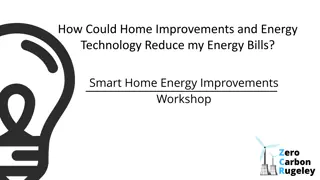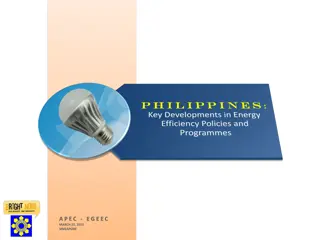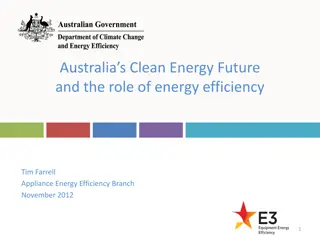Indo-German Energy Programme: Enhancing Efficiency in Industry
"The Indo-German Energy Programme (IGEN) focuses on enhancing energy efficiency in industry through various projects and partnerships. With over 50 years of experience, GIZ, a service provider for the German government, implements initiatives in areas like clean energy, sustainable urban development, and climate adaptation. The collaboration between Germany and India has led to significant impacts such as increasing productivity for farmers, improving basic services for urbanites, and reducing CO2 emissions. Explore the transformative initiatives in energy efficiency and sustainable development through the BEE-GIZ partnership established since 1995."
Uploaded on Mar 12, 2025 | 1 Views
Download Presentation

Please find below an Image/Link to download the presentation.
The content on the website is provided AS IS for your information and personal use only. It may not be sold, licensed, or shared on other websites without obtaining consent from the author.If you encounter any issues during the download, it is possible that the publisher has removed the file from their server.
You are allowed to download the files provided on this website for personal or commercial use, subject to the condition that they are used lawfully. All files are the property of their respective owners.
The content on the website is provided AS IS for your information and personal use only. It may not be sold, licensed, or shared on other websites without obtaining consent from the author.
E N D
Presentation Transcript
Indo-German Energy Programme (IGEN) Energy Efficiency in Industry & Data
GIZ Wholly owned by the Government of the Federal Republic of Germany Service providers on behalf of the whole of German Government 120 countries 1467 projects 24977 employees 19 Billion Euros Over 50 years of experience and expertise in a range of thematic areas Energy II Environment II Climate Change Natural Resource Management II Skills & Vocational Training Education II Water II Health II Good Governance ..and many more!!
GIZ India
GIZ India Thematic Areas Clean Energy and Energy Efficiency Sustainable Urban Development Germany and India are jointly working on Climate and Environment Private Sector Development
GIZ in India Impacts Green Innovation Centres and ProSoil increase productivity and income of 139,000 farmers and rehabilitation and protection of 153,000 hectares of soil Indo-German cooperation has improved basic services for 100 million urbanites Private Sector Development & Vocational Education and Training provided cooperative training opportunities have skilled 11,000 youth across 4 Indian states The Indo-German program for Energy Efficiency saves over 90 million tonnes CO2per year Climate Adaption projects improve water security for 2.8 million people. State climate action plans enhance climate resilience of 150 million people Projects under the Indo-German Partnership for Green Urban Mobility will improve Metro and bus services for 1.5 million people The Indo-German Social Security Programme helped to insure 454 million people under the national health insurance scheme (PM-JAY) Technical assistance for the Solar Rooftop sector achieved upskilling of 60,000 young solar engineers
BEE-GIZ Partnership (a transformative past) 1st efficiency between GTZ and EMC, in 1995, followed by EC Act 2001, and establishment of BEE Indo-German project energy launched National Competition Conservation for school children level Painting Energy Certification Energy Energy Auditors (EA) examination Managers for Support EESL towards formation of on (EM) and Implementation of PAT scheme including its deepening widening Bachat Lamp Yojana (BLY) transformation incandescent bulbs to CFLs Support efficient certification- a scheme for Brick Industry Market Transformation towards enterprise Energy (E3) and from Page 7 3/12/2025
Energy Efficiency in Industry & Data 3/12/2025 Page 8
Outputs Capacity building for SDAs Peer to peer learning Introduce exchange formats to encourage learning and replication at SDA and industry cluster level. Strengthening selected SDAs in developing industry service portfolio and using knowledge tools. National EE dialogue EE knowledge products Establish national roundtables on EE in the steel and pulp & paper sectors and cooperate with policy makers to further improve overall regulatory framework. Disseminating process benchmarks, supplier data base and feasibility studies via web platform, workshops and trainings.
Projects area of intervention Helpdesk Awareness raising on EE Policy support Gap Analysis Dissemination (Peer to peer) SME Training and capacity building Implementation Support Access to Finance
Awareness Raising Video Tutorials Policy corner Case Studies Knowledge products Process Benchm arks News room Benchm arking tool
Gap Analysis technology and Best practices Policy need assessment barriers and challenges in policy implementation Benchmarkin g tool SDA Industry Identifying communication gap between industry and SDA Benchmarkin g study (around 400 units) barriers and challenge s in adoption SDA training needs
Training and capacity building Process specific Trainings at cluster level Visit to successful Case Studies Policy related trainings Industry and SDA Soft skills trainings to enhance communicati on strategy for SDAs Training webinars Virtual reality -Digital twin based (simulator) trainings
Access to Finance Support in preparation of technology feasibility report (through web portal) Pooling resources of different ministries/ departments Industry Dissemination of various financing schemes of BEE to industries
Implementation Support Providing technical resource to support the implementatio n process Creation of enhanced service portfolio Facilitate vendor interaction Implementation of action plans Industry SDA Strengthening communication strategies with industries Facilitate ESCOs involvement Handholding implementation of policies/ schemes Handholding
Dissemination through peer to peer learning Preparation of exchange formats Experience sharing platform Preparation of training modules Industry and SDA Peer learning workshops Handholding support Exchange visits
Policy Support De-briefing the outcome of state/ cluster levels, policy recommendations/ proposals New Policy Proposals National Level Dialogues Feasibility of measures, synergies departments in tackling the challenges with other Consultation and Dissemination Regional/ State level meetings Discussion on policies, barriers and challenges, solutions/ measures Consultation, Dissemination and implementation Cluster Level forum
Thank you piyush.sharma@giz.de
